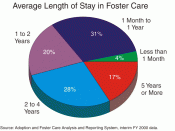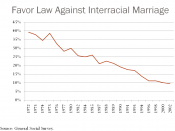Interracial Adoption
Should children of color have to spend the most vulnerable years of their life in foster care or orphanages simply because a family of their race is unavailable? What if a family of a different race could adopt these children? Should they be put into a stable, loving home, or should they be kept in foster homes hoping that a family of the same-race is found? This process of finding same-race families can take years. Why put the children through such hard times when a loving family is available? It is unfair to the children! Interracial adoption benefits the families and children involved and needs acceptance by all Americans.
Opponents of interracial adoption are concerned with identity development and psychological adjustment in children in interracial adoption, because they believe that people cannot raise children of a different race correctly. Therefore, they have referred to it as "cultural genocide."
The National Association of Black Social Workers, the main organization against interracial adoption, believes that their environment and their families influence the children's values, attitudes, and self-image. Therefore, this organization believes that interracial adoption will diminish their culture.
Though some people believe that children in interracial adoptions will not identify with their own culture, actually exposure to both cultures allows them to bridge the culture gap. The most controversial adoptions are between white and black families; nevertheless, the interracial adoption allows the adopted children to function in both black and white cultures. Children in an interracial family tend not to show any racial preference, unlike children in same-race families who prefer their own race. Children in interracial families have the unique experience of living in a white and black world, and using this experience, they are able to understand and relate with their race and their adoptive parents' race. Because...


